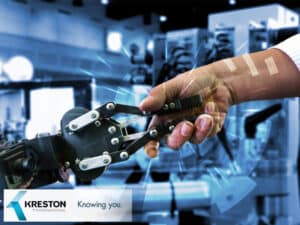Generation Z and the fifth industrial revolution
May 30, 2018
 By Andrew Griggs, Kreston Board Director and Senior Partner of UK member firm Kreston Reeves.
By Andrew Griggs, Kreston Board Director and Senior Partner of UK member firm Kreston Reeves.
In February, the Institute of Chartered Accountants of England and Wales (ICAEW) published its quarterly Business Confidence Monitor. The survey of 1,000 accountants working in businesses across the UK shows a pessimistic picture. Business confidence, whilst improving slightly, remains firmly in negative territory.
Put bluntly, businesses crave certainty and that is in short supply. Change and uncertainty are, it seems, the new normal.
The ICAEW’s Business Confidence Monitor also showed a more cautious approach from businesses to long term investment, and economic data shared at a recent breakfast briefing points to suppressed – and very modest – wage growth.
The picture is complex and extends beyond the looming Brexit deadline.
Organisations are cautious as we are fast entering what has been coined the ‘fifth industrial revolution’; a revolution driven by technology, and one which will be faster, more scalable and adopted by more people than perhaps all previous industrial revolutions. Everything will be more readily available and will make our lives simpler and faster.
Businesses of all sizes are driving this revolution, but they too will feel its impact. The rising influence of technology on all aspects of society is influencing our perception of value – it must be cheaper because it can be made faster and in greater numbers using new technology.
However, the ICAEW Business Confidence Monitor also shows input prices rising by some three per cent yet with sale prices remaining static. The cost of business is increasing, and these costs cannot be passed on to the customer. The pressures of profits today make long term investment a bigger challenge.
At a recent London-based robotics event, attendees were asked if their job existed when they were at primary school – 67 per cent said “no”. [2017 Outsource Magazine.] A study by McKinsey in the summer of 2017 showed that 60 per cent of the workforce could be replaced by technology that exists today. Both are sobering statistics.
Generation Z, sometimes called the ‘IGen’, are now replacing millennials as the youngest members of the workforce. Born in the mid-1990s they have grown up managing their personal brand on Instagram, SnapChat and other social media platforms. The very latest technology is a natural part of their lives.
They are independent and competitive, happy to work alone and to be judged on their own merits. Honesty and transparency are demanded from their peers, the brands they choose to engage with, and from future employers.
Consequently, they relate more easily to an individual brand, are entrepreneurial and more likely to step out of the big corporate environment to explore new workplace experiences. Portfolio careers already commonplace will be normal.
And unlike the calls of the 2000s for a greater work-life balance – something accountancy firms have worked hard to achieve – Generation Z look to work-life integration where the two are seamlessly blended to suit their own needs.
Employers today are having to manage a workforce with very differing needs – the older Baby Boomers approaching retirement, Generation X in senior management roles, Millennials and now Generation Z.
This leaves businesses and their advisers in uncharted territory. Employers of tomorrow will at the very least have to adopt lenient working practices. They will have to accommodate a generation with continued learning, development, the latest technology and challenges to hold on to them.
Customers too are looking for greater value in all they do and buy, and brand loyalty wears thin. With technology changing the way we live and do business, and with unemployment at its lowest for many years, organisations are having to think carefully and in many cases re-prioritising their investments.
Whilst capital investment may continue to be depressed, businesses are re-deploying their profits. They are nervous of investing in the wrong area. Businesses are showing a higher priority in developing and supporting staff and experimenting, especially in IT systems and processes, to improve tomorrow.
Brexit is of course a contributing factor to a lack of business confidence, but we mustn’t forget the impact of both the fifth industrial revolution and the demands of a very different workforce.
So what should businesses do to embrace these challenges? The traditional mantra has been to ‘understand your client’. Businesses if they do not already do so need now to ‘understand their staff’. Listen to what your staff at all stages of their career have to say and where possible act upon it. Understand too the technology that is available today that will affect the way your business works tomorrow. With change being the new normal businesses will need to continuously experiment and try different ways of doing and running their business. Those that do not may not last.
Accountancy firms are having to address these very same problems. We are well-placed to take that step back from a clients’ business and provide the independent and impartial insight businesses need. Scenario planning where the impact of future change is played out today does help businesses prepare for tomorrow.
Businesses are not reluctant to invest, but they are taking their time before making long-reaching decisions. They are also investing much more in their workforce and that cannot be a bad thing.
Please contact Andrew at: andrew.griggs@krestonreeves.com.
Visit www.krestonreeves.com.

